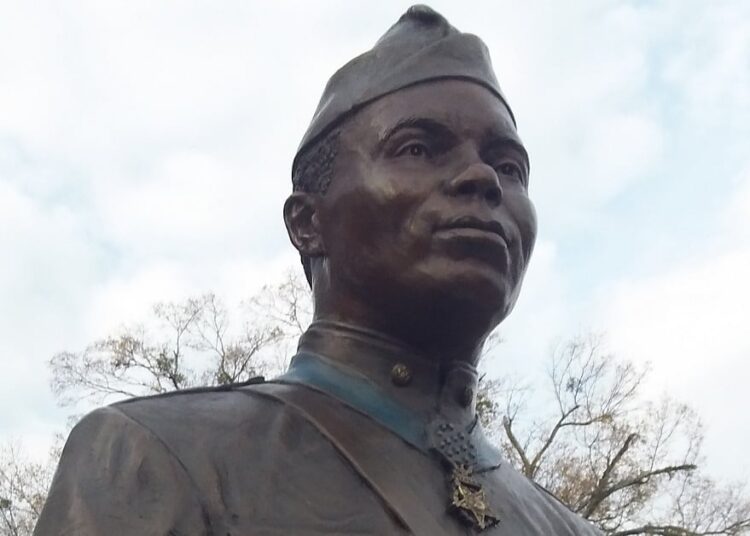Pvt. Burton Holmes of the 371st Infantry Regiment returned to the command post after being badly wounded during a fierce surprise attack by German forces on September 28, 1918. The attack occurred on Hill 188, where Holmes’s unit had been lured out by a false promise of surrender. Holmes refused medical treatment and rejoined the fight with a reserve automatic rifle, continuing to engage the enemy until he succumbed to his wounds.
Holmes’s courage was mirrored by his fellow soldier, Cpl. Freddie Stowers, who continued to crawl forward even after being mortally wounded and encouraged his unit to advance until he too was killed in action. Both soldiers were recommended for the Medal of Honor due to their bravery during the Battle of Hill 188.
Born on January 12, 1896, in Sandy Springs, South Carolina, Stowers was drafted into the Army on October 4, 1917, while working as a farmhand. He trained at Camp Jackson and was assigned to Company C of the 1st Battalion, 371st Infantry Regiment, part of the segregated 93rd Division of the American Expeditionary Forces. The regiment consisted mainly of draftees from South Carolina and was eventually sent to France to bolster French forces at a critical point in World War I.
The 371st was deployed following a request from the French Army for reinforcements, joining the 157th Division, which had suffered significant losses. By mid-September 1918, Stowers had risen to the rank of corporal and was leading a squad within C Company as the Meuse-Argonne campaign commenced.
On September 28, 1918, C Company advanced toward Côte 188 when they were met with enemy fire, leading to heavy casualties. Stowers found himself the highest-ranking officer left standing after many of his leaders had been killed. He crawled forward, rallied the remaining men, and led an assault on German machine gun positions. Despite being shot, he continued to motivate his men until he was fatally wounded. His actions inspired the remaining soldiers of C Company to capture Côte 188, although they suffered significant losses.
Stowers was posthumously awarded the Croix de Guerre by the French and was recommended for the Medal of Honor due to his valor. However, the paperwork for his Medal of Honor was reportedly lost in the Army’s records.
In 1990, the Army reevaluated minority soldiers’ contributions during World War I, leading to the recognition of Stowers’s heroism. On April 24, 1991, his sisters, Georgina Palmer and Mary Jane Bowens, received the Medal of Honor on his behalf at the White House. Stowers is buried at the Meuse-Argonne American Cemetery and Memorial in Romagne-sous-Montfaucon, not far from where he fell.













